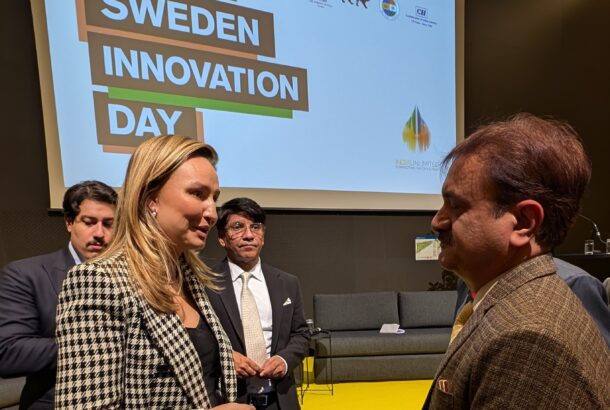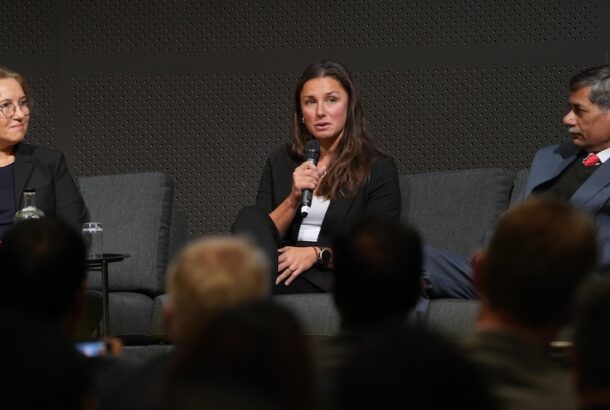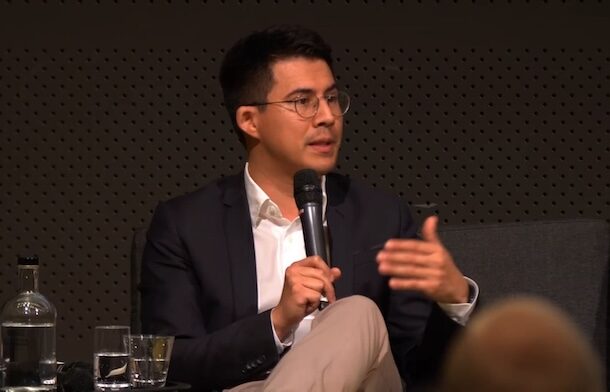India and Sweden the perfect match – driving policy, technology and finance for net zero.
Decarbonizing the global cement and steel industries through partnerships enabled by LeadIT was top of the agenda at the India Sweden Innovation Day held in Stockholm. Speakers discussed how collaboration can drive policy, technology and finance enablers for a net zero future.
Accelerating Green Growth for Inclusive Transition.
The India Sweden Innovation Day, now in its 11th year, is organized by India Unlimited, an organization that promotes cross cultural ties between the two countries. The day is supported by the Embassy of India in Sweden and the Sweden-India Business Council and brings together government, industry and academia.
The theme for 2024 was Accelerating Green Growth for Inclusive Transition. Attendees focussed on how India, as the world’s fifth largest economy, and Sweden, a leader in innovation and sustainability, make an ideal partnership for accelerating innovative solutions for a global green growth transition.
Opening the event on behalf of Sweden, Ebba Busch, Vice Prime Minister & Minister for Energy and Enterprise, said: “We meet at a time when the Sweden India partnership is flourishing. And the digital and green transition is front and centre of our joint efforts. India, with its young population and fast-growing economy, is one of the largest start-up eco-systems globally. Together with Sweden’s global position in innovation, this makes us an unbeatable partnership as we pace towards our net zero commitments.”

Tanmaya Lal, Secretary (West), Ministry of External Affairs, Government of India, added: “The ongoing transformation in India offers unlimited opportunities for collaboration, for development innovations at scale and scope that have global implications.”
LeadIT, and its work to enable collaboration between India and Sweden to decarbonize heavy industry, was very much in the spotlight as the focus of two of the day’s panel discussions.
Energy & India Sweden Industry Transition Partnership (ITP) panel
The ITP was launched at COP28 in 2023 by the Prime Ministers of India and Sweden as a new collaboration between the two countries.
The panellists outlined how its work is divided into five subgroups: steel, cement, innovation, finance and carbon markets, which are focussed on finding successful pathways to decarbonization in India.
Ludvig Lindström, Senior Advisor, Swedish Energy Agency, spoke about the importance of not working in silos and bringing these five subgroups together to meet the key challenges of understanding the incentives and drivers that will support the application of new technologies.
Katarina Malaga, Professor in Sustainable Construction, Head of R&D and Business Development, Research Institutes of Sweden, spoke about the value of a collaboration culture. A sentiment echoed by Tania Irebo, Business Area Manager, Production Technology, from the Swedish metals research institute Swerim, who spoke about learning to move forward together, especially regarding research funding systems that are already well established in Sweden.

Nisha Jayaram, from the Confederation of Indian Industry, highlighted the need to increase academic and industry collaborations and how the ITP can play a role in bringing together international technologies, Indian startups and academia to create more opportunities for innovation.
The growing number of start-ups in India and the impact they can have on the cement industry was also highlighted. Dr S K Chaturvedi, Joint Director, National Council for Cement and Building Materials, Government of India, spoke about how the ITP can help with this growth and serve as a one stop shop solution for the issues around technology development transfer between India and Sweden.
Johanna Lissinger Peitz, Senior Advisor, Swedish Ministry of Climate and Enterprise, concluded the ITP panel discussion by saying that in a year’s time the ITP should be at a stage where a set of pilot projects can be taken to the next step.
I am especially excited about the ongoing work on the India- Sweden Industry Transition Partnership, which engages with leading companies in the cement and steel industries. These have been viewed as particularly hard to abate but essential for our continued economic advancement. Through R&D, innovation and technology dissemination, we will make these sectors greener with mutual benefits to Sweden, India and the rest of the world.
Ebba Busch
Vice Prime Minister & Minister for Energy and Enterprise, Government of Sweden
LeadIT panel – meet the Indian cement delegation working with industry transition
The Innovation Day coincided with a LeadIT hosted visit to Sweden by a delegation from the Indian cement industry. The group were in Sweden as part of the global collaboration work supported by LeadIT, and participated in a panel discussion alongside Felipe Sanchez, who is LeadIT’s Country Partnerships Lead..

The panellists explained how the purpose of the delegation is to learn how technologies developed in Sweden can be applied to the Indian cement industry and how Sweden can learn from the experiences of the Indian cement industry, which has made much progress in reducing its emissions. The panellists also said that they hope to learn how innovative models of finance are designed in Sweden, as unlocking capital is essential for the development and application of the necessary innovative technologies in India.
A member of the Indian cement delegation, Anupam Badola, Deputy CSO at Dalmia Cement, one of the founding members of LeadIT, also spoke about the importance of partnerships in helping the world reach net-zero. “Collaborations like LeadIT are very important. They bring governments, innovators and technology providers to the same platform. There are then possibilities of greater partnerships to drive policy, technology and finance. By accelerating these three levers, it is possible to drive net zero.”
The cement industry in India is already highly efficient when it comes to thermal and electrical energy, and it is expecting more growth and demand. Sweden is a front runner in the transition globally. Bringing India and Sweden together to work together and mutually benefit from collaboration is key.
Felipe Sanchez
Country Partnership Lead, LeadIT
Event Programme
The India Sweden Innovation Day 2024 featured the following panel discussions:
- India Sweden Innovation Partnership
- Energy and India-Sweden Industry Transition Partnership (ITP)
- LeadIT – Meet the Indian Cement Delegation
- Make in India: Analysis and Opportunities
- Travel as a Business Accelerator
- The Next Frontier for India Sweden: AI and Industry
- Sweden and India Tech Community (SITEC): Bridging Innovation and Investment Across Borders
- AI and Innovation for Sustainable and Smart Cities
- Designing for Circularity in Textiles
If you missed the India Sweden Innovation Day 2024 and would like to catch up on the debate you can watch the LeadIT focussed panel discussions here:
It’s clear that partnerships like those between India and Sweden are not just pathways to decarbonizing hard-to-abate sectors - they are essential drivers of global innovation, policy, and financial collaboration. The role of pilots and technology co-development between the global north and south, combined with strong business-to-business partnerships, will be pivotal in translating these innovations into scalable solutions and contributing to an equitable industrial transition.
Arati Davis
Event moderator & Business Co-development Lead, LeadIT
